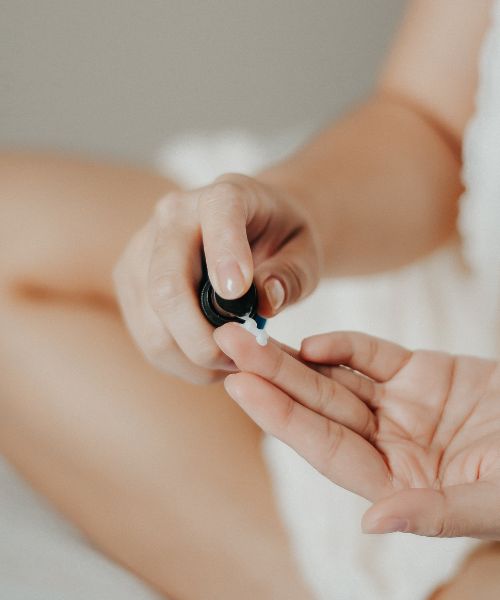A vitamin C serum can be used with retinol, but using them in separate routines and after the skin has adjusted to retinol is the best way to get the best of both ingredients without the risk of irritation.
Vitamin C and retinol are both powerful ingredients that can provide many benefits to the skin, such as fading hyperpigmentation, evening out the skin tone, refining skin texture, and minimizing acne.
However, using these two ingredients together can be tricky.
Therefore, in this article, we’ll discuss why using them in separate routines might be best and how to do so without compromising your skin.
Let’s start with the basics and introduce both ingredients.

How Does Vitamin C Work?
Vitamin C is an antioxidant that helps reduce the damage done to the skin by free radicals, which as unstable molecules found in our environment that degrade vital parts of cells, including their membranes, proteins, and DNA, by stealing their electrons through a process called oxidation.
This will then go on to cause irregularities in skin function and appearance, such as premature wrinkles, uneven skin tone, etc.
Antioxidants like vitamin C have been observed to brighten the skin, even out the skin tone, reduce the appearance of fine lines and wrinkles, and reverse the damage done by the UV rays, such as brown sun spots.
This also proves vitamin C’s pigment-inhibiting properties, making it an essential part of a pigmentation-fighting regimen.
Vitamin C inhibits tyrosinase, an enzyme responsible for the production of melanin, which is the brown pigment that gives skin its color.
However, sometimes when there’s inflammation or some sort of imbalance involved (such as hormonal imbalances,) this enzyme can become overactive, causing spots and patches darker than the surrounding area.
Vitamin C helps reduce this overactivity and thus helps even out the skin tone and fade hyperpigmentation.
Lastly, vitamin C also has some anti-inflammatory properties and can help reduce redness and blemishes in some cases.
So from all this, we can tell that the benefits of using vitamin C in your skincare routine are many, and the most commonly observed ones include plumper and glowier skin, reduced inflammation, evened-out skin tone and texture, reduced hyperpigmentation, and a more uniform complexion.
How Does Retinol Work?
Retinol is a derivative of vitamin A and a cell-communicating ingredient that binds to retinoid and tyrosinase receptors in the skin and “tells” them to do their job in maintaining the skin cells better.
By doing this, vitamin A normalizes cell functions and influences the cells to behave in a healthier and younger way, cutting the natural cell turnover in half, and bringing it down to about 15 days from the usual 30 days it takes for the cell to be born and travel through the epidermal layers and to the skin’s surface where it will die and shed.
The increased cellular turnover will make the skin look youthful, clearer, brighter, and smoother.
Additionally, by speeding up cellular turnover, retinol, or vitamin A also helps push the cells that have remained stuck inside the pores and formed comedones (blackheads, whiteheads, and inflamed pimples) to the top.
This will essentially result in fewer acne breakouts and a decrease in the appearance of existing ones.
All vitamin A derivatives, including retinol, offer many benefits for the skin, including a smoother, refined texture, evened-out skin tone, and clearer, healthier-looking skin.
Can You Use Vitamin C Serum With Retinol?

The best way to use vitamin C serum with retinol is to use both products in a separate skincare routine.
The best way to introduce both ingredients into your skincare routine is to start by getting your skin used to retinol.
This is because the skin will take longer to get used to retinol than vitamin C, and there will likely be an initial period of mild discomforts such as peeling, sensitivity, and purging, which is just the skin pushing out all the clogged oils, dirt, and bacteria to the surface as pimples so that they can heal.
This is called retinization and can last anywhere from four weeks (one skin cycle) up to twelve weeks (three skin cycles.)
Additionally to this, retinol, although different, will provide similar results to vitamin C, especially when it comes to some of the major skin concerns, like fine lines, uneven skin texture, hyperpigmentation, and acne.
This is why you don’t need to introduce them at the same time, considering you will be getting similar results.
Once your skin has gotten used to retinol and you have been using it for a few months, you can gradually introduce vitamin C serum into the routine.
Since retinol should always be used at night due to its photosensitivity, you should use the vitamin C serum as part of your morning routine before your moisturizer and sunscreen.
Additionally, when starting vitamin C, try to leave a day’s break in between and see how your skin will react to the change.
Although vitamin C doesn’t usually take time to get used to, you still want to make sure that you won’t have an adverse reaction.
And if all goes well, you can gradually increase the frequency of vitamin C usage to every day over the course of several weeks.
The Risks of Using Vitamin C With Retinol
Vitamin C and retinol will work great to give your skin a smooth and even tone, but there can also be some risks when used together.
The primary concern when using both actives is irritation, as the skin might not initially take too well to the combination.
This is why it’s important to start slowly and introduce them into your routine one at a time so that you can have a clear understanding of how your skin will react to each product.
Additionally, should there be side effects, you can easily recognize which product is causing it and stop using it.
Other than irritation, the next major concern is a cosmetic one, which is peeling.
Initial peeling is a common side effect of retinol; however, it may come back when you start using vitamin C serum, as this ingredient can also make the skin more sensitive in the beginning.
If the peeling is mild and you’re not experiencing any burning and stinging sensations, you can continue with moderate usage.
Otherwise, it’s best to wait a few days and reintroduce the product by gradually increasing the frequency of usage.
If the skin won’t take to the product and continues to become red, irritated, and itchy, it’s probably best to say goodbye to the product, and either look for something else or stick to what works.

My name is Simone and I am a certified skin specialist. I created this website to teach my readers how to take great care of their skin and I also like to occasionally share my honest opinions on skincare products I’ve tried. You can learn more about me here.
